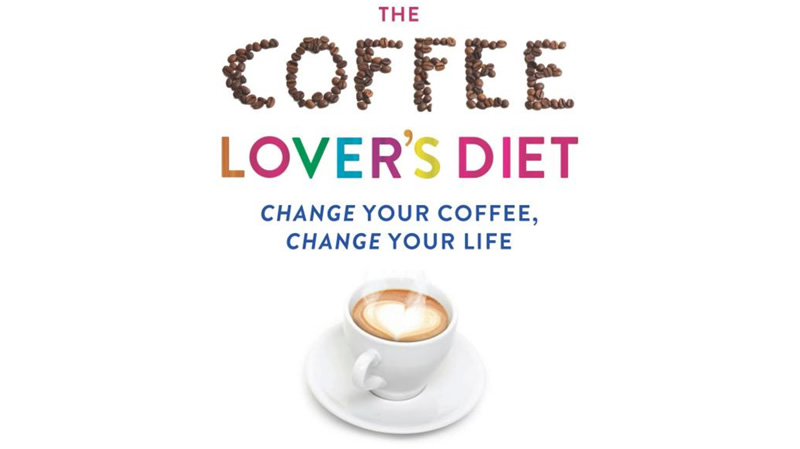Coffee Lovers Diet: The Key to Health and Weight Loss?

We recently stumbled across a new book called The Coffee Lover’s Diet: Change Your Coffee, Change Your Life and were instantly intrigued by the concept.
The book’s author is Dr. Bob Arnot, who is a physician and was previously a medical correspondent for TV networks such as NBC and CBS. His idea for writing the book came from his investigation on the Ikarians who are some of the oldest living people on the planet and the coffee that they typically drink.
They drink coffee differently than most people in the west. Their coffee is Greek coffee which is finely ground and boiled before serving. This coupled with their lifestyle and a Mediterranean diet is believed to be the source of their longevity.
Change Your Coffee, Change Your Life?
Dr. Arnot believes that if westerners change the way they drink their coffee, they too can help unlock coffee’s true potential for delivering better health and longevity.
He believes this starts by selecting the right coffee beans and the right roast. High-phenol (high-antioxidant) beans should be selected and they should only be lightly roasted so that they retain the most phenols.¹
The next step is to prepare the coffee similar to the Greeks. Grind the beans correctly, use the best water temperature for extraction, and favor methods that have a longer extraction time.
However, people should avoid using sugar or dairy in their coffee and he believes they won’t miss it since high-phenol coffee tastes much better black than does the poor quality coffee most people are used to drinking.
Dr. Arnot believes that if people start drinking coffee this way they will notice dramatic changes in their moods, energy levels, and overall better health.
His Study
In conjunction with Dr. David Nieman from North Carolina Reseach Campus, a double-blind placebo-controlled trial was developed to test the effectiveness of high phenol coffee.
According to the first chapter of the book, one group of participants were given high-phenol caffeinated coffee and the other where given low-phenol decaffeinated coffee (placebo). They continued using either for 2 weeks. After a short washout period, the two groups were given the opposite sample for two weeks.
The participants’ TDM (total mood disturbance) was then measured before and 30 minutes after the dose. Those that consumed the high-phenol caffeinated coffee reported energy, liveliness, and more positive mood.
The Diet
As far as dietary recommendations to lose weight the book is pretty standard. Dr. Arnot starts by explaining how high-phenol coffee and caffeine in general aid in fat loss by speeding up the metabolism and by helping the body utilize stored fat for energy.
Besides drinking high-quality coffee, a diet rich in plant-based foods is encouraged, as well as some lean protein. Many of the principles of the Mediterranean diet are recommended. By avoiding processed foods, added sugar and other refined carbs, dieters will naturally reduce their calorie intake and lose weight.
Problems With The Coffee Lover’s Diet?
The most glaringly obvious problem with the diet is his faulty study. He had one group consume caffeinated high-phenol coffee and the other group (placebo) consume decaffeinated low-phenol coffee. Anyone who has ever studied the scientific method knows that a valid study can only test for ONE variable at a time. His study actually had TWO variables; caffeine and phenols (CGA).
He should have used caffeinated high-phenol coffee and a placebo of caffeinated low-phenol coffee as his placebo. Of course, the people who had the caffeinated coffee were going to report better mood, energy, and productivity since that’s what caffeine does. The decaf group, of course, were going to feel lousy especially if they had previously been caffeinated coffee drinkers…
Dr. Arnot sells his own brand of high-phenol coffee (Dr. Danger Coffee), so there is a potential conflict of interest. Arnot has also filed a patent on the high-phenol method of making coffee.
I wouldn’t argue that high-phenol coffee is better for one’s health than low-phenol coffee because antioxidants are one of the key factors in coffee’s health promoting effects, but people would notice these benefits over time, not immediately.
Dr. Arnot says that people feel better immediately after his coffee when compared to the their normal coffee drink. The problem with that logic is that Greek style coffee also has more caffeine per ounce than western brewed coffee. So if people suddenly switch from one to the other, they will feel a difference because of the caffeine levels.
It’s also worth noting that traditionally both Greek and Turkish-style coffee are served with sugar and can be pretty sweet. I would assume that the Ikarians also consumed their coffee this way (although cannot verify this).
Final Conclusions
Healthy eating and getting more antioxidants through natural products like coffee does have a positive influence on one’s mind, weight, and longevity. But, Dr. Arnot’s diet would have a little more credibility if he didn’t have his own brand of coffee attached to it and if he conducted scientifically valid studies to support his theory.
If you love coffee, it can be part of a healthy diet and if nothing else, the book does show people how to get the most health benefits out of their coffee by altering their brewing technique as well as selecting higher quality coffees.
There’s also no reason why a person can’t add a little cream and sugar to their coffee if desired. This doesn’t change the antioxidant factor of the coffee and typically adds only a few calories. It’s far more important for people to cut out sugary drinks like soda and even fruit juice than it would be to skip the teaspoon of sugar and splash of cream in their coffee.
Dr. Arnot’s book is available on Amazon.com.

Get Help Quitting Caffeine
Reduce your caffeine intake without pain and discomfort.
Download our FREE ebookReferences
- Jung Soohan, Kim Min Hyung, Park Jae Hee, Jeong Yoonhwa, and Ko Kwang Suk. Journal of Medicinal Food. June 2017, 20(6): 626-635. study





